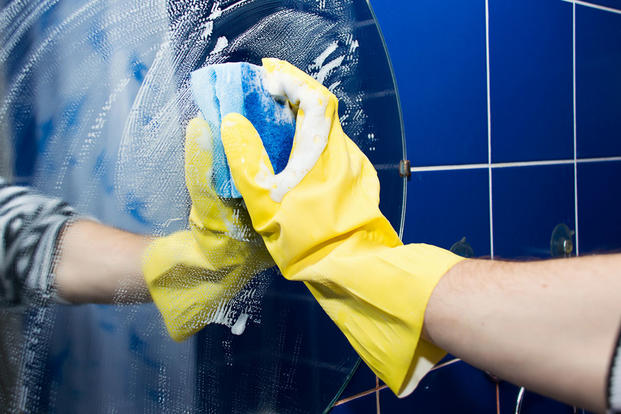Post from MilitaryByOwner
Rental security deposits are a big chunk of money that most of us depend on the return of in its entirety for facilitating the next move. Whether it’s paying for another security deposit or cash to have on hand to cover extra moving expenses, a security deposit is hard earned money to protect and defend.
The best way to guarantee a full return of your security deposit and/or to have a zero balance remaining on your final inspection paperwork is to become very educated on your leaser’s policies. Read your lease in its entirety before signing, ask questions, and frequently check in with the company’s social media to take note of any changes in the move-out procedures.
Read and Plan Ahead
Military families typically plan within the framework of years in advance, so it’s second nature to think about leaving as soon as the boxes are unpacked. When you sign the housing agreement, obtain a copy of the departure inspection checklist to read over and become familiar with the fixes you’ll have to make on your own during the tenancy and before you leave.
Unlike signing a lease with a private homeowner, local base housing contracts are more rigid because they have corporation guidelines to uphold. This is both good and bad for military renters. Traditional landlords might make provisions or exemptions for your particular situation at their discretion, whereas base housing employees often have their hands tied to company policy.
But, and this really a huge benefit for renters, even if it seems painful at the time — privatized base housing offices have their departure requirements spelled out clearly, so there’s not much discussion as to what damage was inherited or which wear and tear needs to be fixed before PCS.
For example, those builder grade mini-blinds the house comes with are certain to break while you live there. Either remove them to reinstall before move out, or make sure you buy replacements as needed. Although inexpensive at Home Depot, they’ll likely be extremely expensive on the repair sheet your base housing company tallies.
Security Deposit or No Security Deposit?
There is a twist to reclaiming base housing security deposits, however. Several privatized housing companies waive a security deposit if rent is deducted by allotment from the service member’s pay each month. Lincoln Military Housing is one company that does not require a deposit:
What will be my responsibility in paying the lease?
The military member is responsible for signing the lease and making the monthly payments, preferably by authorizing an allotment or EFT. If payment is made by allotment, then there will be no security deposit. If a member chooses to pay by check, we require a security deposit in the amount of one month’s rent, and the rent must be paid in advance rather than in arrears. There are some installations that only accept payment by allotment.”
Note: These policies vary from company to company and base to base, so it’s crucial to research ahead. Also, be aware that policies regarding destruction caused by pets and pet security deposits are separate from standard rental agreements. They may require different funding and checkout procedures.
What Are You Liable For?
If you don’t have a security deposit to worry about, what will you be liable for? Barring extreme destruction circumstances, housing companies hold the service member accountable for the cleanup and repair of specified items. In general, a deep clean of the entire house is expected, including kitchen appliances and carpets, as well the repair of holes in the wall.
There are exceptions to these guidelines: the house might be on schedule to receive new carpeting or updated paint for the entire house. Your housing office will advise you of the details, but the inspection checklist should answer most questions.
Prepare to Clean!
Preparing a cleaning schedule months to weeks out saves time and energy. Although the “final out” inspection list might not appear long, proper cleaning involves several days. You’ll probably want to begin in the yard and garage for the most efficient cleaning strategy, saving the inside work for closer to the day of leaving.
A very good option to make sure your deposit is returned is to hire a professional cleaning crew. If your budget allows for a reputable company to come in and make quick work of your clean-up, then do it. This service reduces the stress load significantly. There are entire industries built around catering toward renters and their move-out inspections. The housing office may also offer a quick move-out based on a set cleaning fee, which they will then handle with a contracted cleaning company.
For extra protection, supply the cleaning company with a copy of the inspection list and have them sign a guarantee that their work will indeed meet the standards, or they’ll return to clean correctly until the service member passes inspection.
Living in base housing can be an enormous benefit for military members. To make the most of this option, adhere to the housing company’s procedures regarding move-in and out inspections and security deposit returns. Learn early the details of what the inspection checklists looks like and prepare well in advance. It’s never a bad idea to take pictures on the days of move-in and move-out inspections.
Keep Up-to-Date for Your Next PCS
Get the inside information from those who know. Get PCS help and all the news and benefits information you need delivered straight to your inbox. Subscribe to Military.com now.




